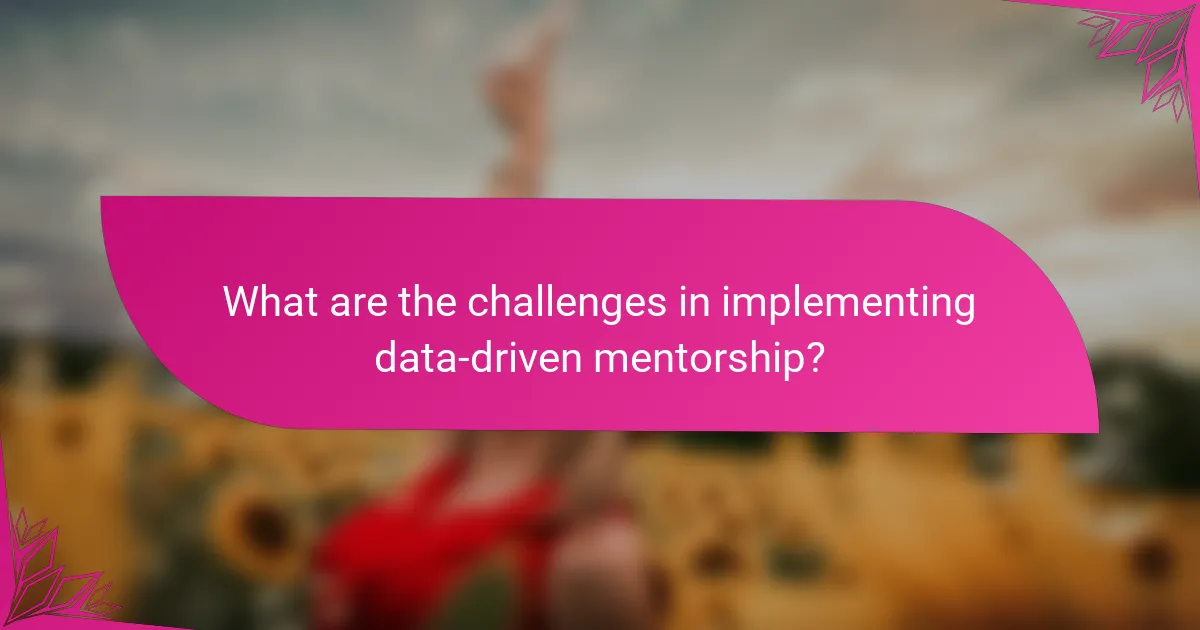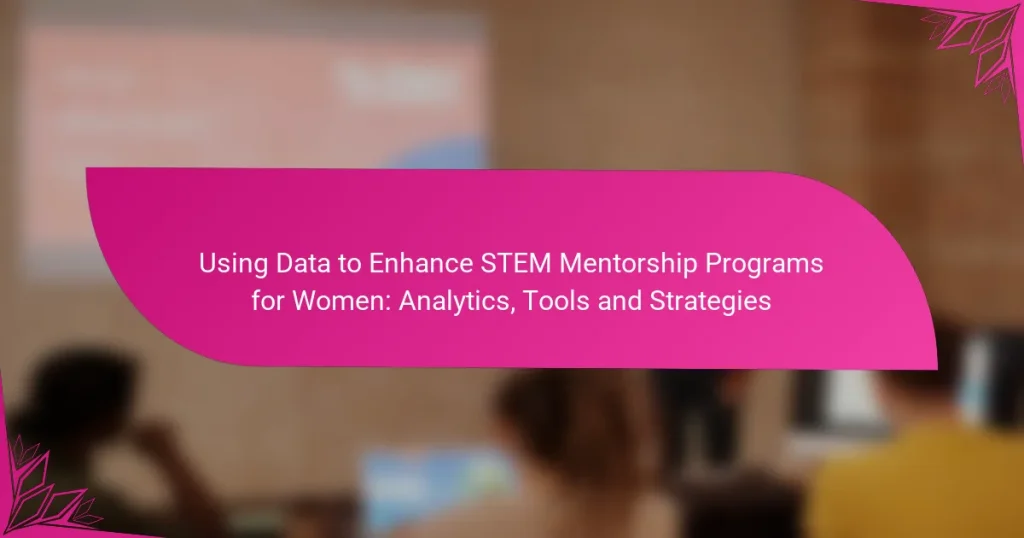Utilizing data analytics in STEM mentorship programs for women can lead to more effective and tailored initiatives that address specific participant needs. By employing various tools to track engagement and outcomes, organizations can enhance the mentorship experience, fostering a supportive environment that encourages women’s participation and growth in STEM fields.

How can data analytics improve STEM mentorship for women?
Data analytics can significantly enhance STEM mentorship programs for women by providing insights into participant needs, tracking outcomes, and improving overall program effectiveness. By leveraging data, organizations can tailor their mentorship initiatives to better support women in STEM fields.
Identifying participant needs
Understanding the specific needs of women in STEM mentorship is crucial for program success. Data analytics can help identify gaps in skills, knowledge, and support systems by analyzing surveys, feedback, and demographic information.
For example, organizations can use data to determine which technical skills are most sought after by mentees or to identify common barriers faced by women in these fields. This targeted approach allows programs to develop tailored resources and support mechanisms.
Tracking mentorship outcomes
Monitoring the outcomes of mentorship programs is essential to assess their impact and effectiveness. Data analytics can track various metrics, such as retention rates, career advancement, and participant satisfaction.
By collecting and analyzing this data, organizations can identify successful strategies and areas needing improvement. For instance, if a program sees a high retention rate among participants who receive specific types of mentorship, it can focus on replicating those elements in future initiatives.
Enhancing program effectiveness
Data-driven insights can lead to continuous improvements in mentorship programs. By regularly reviewing collected data, organizations can adapt their strategies to better meet the evolving needs of women in STEM.
Implementing feedback loops, where participants can share their experiences and suggestions, can further refine program offerings. Additionally, using analytics to benchmark against similar programs can provide valuable context and highlight best practices.

What tools are available for data analysis in mentorship programs?
Several tools can enhance data analysis in mentorship programs, particularly for women in STEM. These tools help track engagement, visualize data, and match mentors with mentees effectively.
MentorMatch software
MentorMatch software is designed to facilitate mentor-mentee pairings based on skills, interests, and goals. By utilizing algorithms, it can analyze participant profiles to create optimal matches, improving the overall effectiveness of mentorship programs.
When implementing MentorMatch, consider the user interface and ease of use for both mentors and mentees. A straightforward onboarding process can significantly enhance engagement and retention rates.
Tableau for data visualization
Tableau is a powerful tool for visualizing data collected from mentorship programs. It allows users to create interactive dashboards that can display trends in participation, engagement, and outcomes over time.
To maximize Tableau’s effectiveness, focus on key performance indicators (KPIs) relevant to your program’s goals. Regularly updating visualizations can help stakeholders quickly identify areas for improvement and success.
Google Analytics for engagement tracking
Google Analytics can track user engagement on mentorship program websites and platforms. By analyzing metrics such as page views, session duration, and user demographics, organizations can gain insights into how participants interact with the program.
To effectively use Google Analytics, set up specific goals related to user actions, such as signing up for mentorship or attending events. This data can inform adjustments to marketing strategies and program offerings, ensuring they meet the needs of participants.

What strategies enhance the effectiveness of STEM mentorship programs?
Effective STEM mentorship programs for women can be enhanced through tailored approaches, consistent feedback, and robust networking opportunities. These strategies create a supportive environment that fosters growth and encourages participation in STEM fields.
Personalized mentorship approaches
Personalized mentorship involves matching mentors and mentees based on shared interests, backgrounds, and career goals. This tailored connection allows for more relevant guidance and support, increasing the likelihood of successful outcomes.
Consider implementing assessments to identify the specific needs and aspirations of mentees. For instance, a survey could help determine their preferred learning styles or areas of interest within STEM, enabling mentors to provide customized advice and resources.
Regular feedback mechanisms
Establishing regular feedback mechanisms is crucial for the continuous improvement of mentorship programs. Scheduled check-ins, surveys, or informal discussions can help assess the effectiveness of the mentorship relationship and identify areas for adjustment.
Encourage both mentors and mentees to share their experiences openly. This two-way feedback can lead to actionable insights, allowing programs to adapt and better serve participants’ needs. Aim for feedback sessions every few months to maintain engagement and address any concerns promptly.
Networking opportunities for mentees
Creating networking opportunities is essential for mentees to build connections within the STEM community. Organizing events such as workshops, conferences, or informal meetups can facilitate interactions with industry professionals and peers.
Consider leveraging online platforms to expand networking reach, especially for those in remote areas. Virtual events can provide access to a broader audience, allowing mentees to connect with role models and potential collaborators from different regions or countries.

What metrics should be used to evaluate mentorship success?
To evaluate mentorship success in STEM programs for women, key metrics include participant retention rates, mentee satisfaction surveys, and career advancement statistics. These metrics provide insights into the effectiveness of mentorship initiatives and help identify areas for improvement.
Participant retention rates
Participant retention rates measure the percentage of mentees who continue in the program over a specific period. High retention rates indicate that mentees find value in the mentorship experience, while low rates may signal issues such as lack of engagement or support.
To improve retention, programs should regularly assess mentee needs and provide ongoing resources. Consider implementing check-ins at regular intervals to address any concerns and adapt the program as necessary.
Mentee satisfaction surveys
Mentee satisfaction surveys gather feedback on various aspects of the mentorship experience, including the quality of guidance, communication, and overall satisfaction. These surveys can be conducted annually or after key milestones in the program.
Using a mix of quantitative ratings and qualitative feedback can provide a comprehensive view of mentee experiences. Aim for a response rate of at least 70% to ensure the data is representative and actionable.
Career advancement statistics
Career advancement statistics track the professional progress of mentees, such as promotions, salary increases, or job placements in STEM fields. These metrics help assess the long-term impact of mentorship on career trajectories.
To effectively measure this, consider establishing a baseline before the mentorship begins and follow up at regular intervals. Comparing these statistics against industry benchmarks can also provide context and highlight the program’s effectiveness.

How can organizations foster inclusive mentorship environments?
Organizations can foster inclusive mentorship environments by implementing strategies that prioritize diversity, create safe spaces for dialogue, and promote allyship among participants. These approaches help ensure that mentorship programs are supportive and effective for women in STEM fields.
Diversity training for mentors
Diversity training equips mentors with the knowledge and skills to understand and address the unique challenges faced by women in STEM. This training should cover topics such as unconscious bias, cultural competence, and effective communication strategies.
Organizations can implement workshops or online courses that last a few hours to a couple of days, depending on the depth of content. Regular refresher sessions can help keep mentors updated on best practices and emerging issues.
Creating safe spaces for discussions
Creating safe spaces allows mentees to express their thoughts and experiences without fear of judgment. These environments encourage open dialogue about challenges and successes, fostering trust and connection between mentors and mentees.
To establish these spaces, organizations can host regular check-ins or focus groups where participants can share their experiences. Ensuring confidentiality and promoting respectful communication are essential to maintaining a supportive atmosphere.
Promoting allyship within programs
Promoting allyship involves encouraging mentors and peers to actively support and advocate for women in STEM. This can include recognizing achievements, providing constructive feedback, and standing against discrimination or bias.
Organizations can facilitate allyship by offering training sessions that highlight the importance of support networks. Creating mentorship pairs that include allies can also enhance the experience for women, providing them with additional resources and perspectives.

What are the challenges in implementing data-driven mentorship?
Implementing data-driven mentorship programs for women in STEM faces several challenges, including data privacy concerns and the need for adequate resource allocation for data tools. These obstacles can hinder the effectiveness of mentorship initiatives and limit their potential impact.
Data privacy concerns
Data privacy is a significant challenge when implementing data-driven mentorship programs. Collecting and analyzing personal information about mentees can raise ethical questions and compliance issues with regulations such as GDPR in Europe or CCPA in California. Organizations must ensure that they have robust data protection measures in place to safeguard sensitive information.
To address these concerns, mentorship programs should prioritize transparency with participants about what data is collected and how it will be used. Providing clear consent forms and allowing mentees to opt-out of data collection can help build trust and ensure compliance with privacy laws.
Resource allocation for data tools
Effective data-driven mentorship requires investment in the right tools and technologies. Many organizations may struggle with allocating sufficient resources for data analytics platforms, training staff, and maintaining these systems. Without proper funding and support, the implementation of data-driven strategies may falter.
Organizations should evaluate their current resources and consider partnerships with tech companies or educational institutions that can provide access to data tools at a lower cost. Additionally, prioritizing training for staff on how to utilize these tools effectively can maximize the return on investment and enhance program outcomes.


